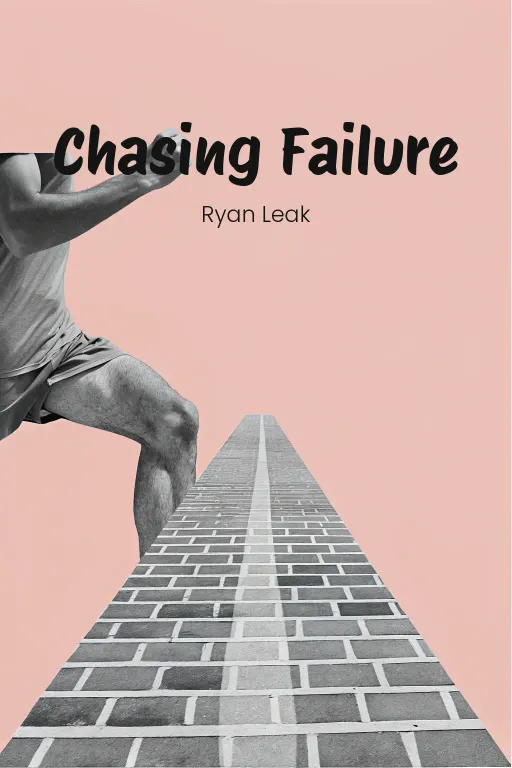
Fail Fast: Your Launchpad to Success
Podcast by Beta You with Alex and Michelle
How Falling Short Sets You Up for Success
Introduction
Part 1
Alex: Hey everyone, welcome to the show! Let’s dive right in with a question that might make some of you cringe: What if failure, something most of us try to avoid at all costs, is actually the “best” thing that could happen to you? Michelle: Woah, hold on. You're saying messing up big time could actually lead to success? That sounds a bit… overly optimistic, Alex. You’re gonna have to sell me on this one. Alex: That's exactly the idea Ryan Leak explores in his book, Chasing Failure. He argues that failure isn't the enemy. In fact, it's a launchpad. It’s full of real-life examples and powerful insights, and it completely rethinks how we should view failure. Michelle: Alright, you've piqued my interest. So, what are we going to unpack exactly? Alex: We're going to look at three main things. First, we'll talk about how to reframe both fear and failure as tools for personal growth. Basically, how to flip the script on what failure really means to us. Michelle: So, instead of running from failure, we should… embrace it? Like that weird uncle at Thanksgiving? Interesting. What's next on the agenda? Alex: Next, we’ll get into what it takes to really go after your dreams with boldness and decisive action. Leak emphasizes that courage and a solid plan are key here. Michelle: Boldness, huh? So, this isn't just about failing, but failing “forward”? I like that. What else have you got for me? Alex: Finally, we'll uncover the secrets to building resilience, those small wins and consistent efforts that can turn setbacks into major comebacks. It all boils down to persistence, really. Michelle: Sounds like we’re building a roadmap for making failure a… positive experience? Let's see if I’m singing a different tune about failure by the end of this.
Reframing Fear and Failure
Part 2
Alex: Alright, Michelle, let's dive right in. Reframing fear and failure... it really starts with understanding why society treats them like the plague, doesn't it? Leak points out that we often see failure as proof of inadequacy, and that fear of judgment, or losing our sense of worth, is what “really” keeps us stuck. It's not the failure itself, it's the “meaning” we attach to it. Michelle: Yeah, that totally makes sense. I mean, whenever someone screws up publicly, especially with social media now, it's like a walk of shame, but at warp speed! People jump all over it, and suddenly, one bad moment defines you. So, you're saying Leak thinks this fear actually stops people before they even try? Alex: Exactly. He talks about how this societal stigma creates what psychologists call "atychiphobia"—which basically means a heightened fear of failure. This fear convinces us that failing isn't just painful, it's catastrophic! Leak uses some great examples to show how that fear paralyzes people, keeping them in their comfort zones, avoiding risks, and missing out on opportunities. Michelle: Okay, but how do you even start to fight something so deep-rooted? I mean, if you’ve been conditioned your whole life to see failure as a black mark, how do you change that story? Alex: That's a great question, and that's where Leak's perspective “really” shines. He urges us to separate failure as a single event from shame as a lasting identity. It’s about reframing failure itself. You didn’t get that promotion? It doesn’t automatically mean you’re incapable; it could mean you need to work on a specific skill, or that the job wasn't the right fit. Michelle: Right, so he separates "I failed" from "I’m a failure." Simple, but powerful. It reminds me of Thomas Edison and his approach to inventing. Didn’t he say something like, "I didn’t fail 1,000 times. The light bulb just took 1,000 steps"? Alex: He does mention Edison, yes! Edison reframed his setbacks as part of the process. What society calls failure, he called learning. That’s a huge mind-shift: seeing mistakes as stepping stones to success, rather than scars on your résumé. Michelle: Okay, I get the theory. But come on, how do you “actually” put this into practice in your day-to-day life? You know, when you’re lying in bed replaying every little mess-up? Alex: That's where his strategies come in. First, he challenges us to confront our fear head-on. He suggests asking, “What’s the worst that could happen?” And then, “If I knew failure wasn’t permanent, what would I attempt?” It’s about deflating the drama we often attach to the idea of failure and realizing that, most of the time, the stakes aren’t as high as we think. Michelle: Hmm, like when you’re terrified of giving a presentation at work, but realistically, even if you totally bomb, no one’s going to fire you over it. At worst, they forget about it in a week, you know? Alex: Exactly. He also emphasizes breaking down failure into smaller, easier-to-manage pieces. Say someone applies for a job and gets rejected. Instead of spiraling into self-doubt, Leak would have them analyze it: Was this position actually a good fit to begin with? Did I prepare enough? Could I improve my interview skills? It turns a vague feeling of inadequacy into specific steps for improvement. Michelle: Kind of like running a post-game analysis on your mistakes instead of just giving up, right? I like that – makes failure seem less like an emotional beatdown, and more like a puzzle you can solve. Alex: Exactly! And he “really” pushes for self-compassion. Instead of beating yourself up over mistakes, treat yourself the way you would a good friend. You wouldn't tell a friend they're a loser if they failed, so why do we say that to ourselves? Michelle: True, but I think easier said than done. A lot of people feel like letting themselves off the hook is a sign of weakness, you know? Like, if you’re too easy on yourself, you won’t improve. Alex: That’s a common misconception, and Leak addresses that directly. He argues that self-compassion isn’t weakness; it’s what creates the safe space needed for growth. It’s not about ignoring your mistakes but about processing them constructively instead of destructively. This is especially important if perfectionistic tendencies have been holding you back. Michelle: Right, and let's not forget how perfectionism gets amplified on social media these days. Everyone sees the highlight reels – people posting their wins, their vacations, their avocado toast – but no one's spotlighting their failures. It creates this illusion that success is effortless, like you’ve either made it or you haven’t. Alex: Leak discusses that too. He points out how perfectionism and unrealistic expectations suffocate creativity and exploration. He invites readers to embrace the messy, imperfect process instead of chasing an impossible standard. Michelle: That idea of ditching perfection reminds me of Leak's own story, his NBA tryout. I mean, the guy knew it was a long shot, but he went for it anyway. It's such a great example of reframing failure. He wasn’t focused entirely on the result; he was focused on growth. Alex: Exactly. By chasing what most would see as "certain failure," he uncovered courage and resilience in himself. Leak came away from that experience with valuable insights that elevated him in other areas of life. His story is proof that even a so-called failure is worthwhile when it’s faced with the right mindset. Michelle: Alright, Alex, I’ve got to admit – this is starting to click for me. Maybe failure isn’t the villain we make it out to be. If anything, it’s an annoying, but necessary sidekick on the road to growth. Alex: That's the spirit! Whether it’s through self-awareness, reframing, or just taking intentional risks, Leak shows us how failing forward can open doors we never even imagined.
Pursuing Dreams Fearlessly
Part 3
Alex: So, seeing failure as a stepping stone naturally leads us to the idea of pursuing dreams fearlessly. That includes tackling procrastination, setting achievable goals, and the importance of mentorship and community. Michelle, where do you stand on the whole procrastination-as-fear thing? Michelle: Oh, procrastination? You’re talking to an expert. It's like fear’s sneaky sidekick, convincing you that another hour of social media is “essential” research. But you’re saying it's not just laziness—it’s actual fear dressed up in comfortable pants? Alex: Absolutely. Leak actually breaks it down really well. He points out what he calls "Monday resolutions," where we wait for the perfect moment—a fresh week, a new month, when the stars align—to finally start pursuing our dreams. It’s procrastination disguised as diligent preparation. Michelle: So, when I say, “I'm waiting for the right moment,” what I “really” mean is, “I'm avoiding this because I'm terrified of messing up?" Alex: Precisely! Leak argues that procrastination often stems from fearing the unknown or the possibility of failure. And his solution? Immediate, purposeful action. His message is pretty clear: the best time to start is “right now”, even if it’s not perfect. Michelle: Okay, but what does "starting now" look like in practice? Say someone wants to write a novel. How do they go from that intimidating blank page to actually finishing the thing? Alex: Great example! Leak suggests breaking down big dreams into manageable chunks. So, instead of obsessing over the entire manuscript, focus on creating a detailed outline. Then set a realistic daily goal—say, 300 words a day, five days a week. Before you know it, you've got a first draft. Michelle: That’s a to-do list even I could get behind. But what happens when discouragement kicks in? You know, that little voice whispering, “This isn’t good enough,” or “What’s even the point?” Alex: That's a valid concern, and that's where reframing your goals comes into play. Instead of aiming for perfection straight away, Leak encourages you to focus on making consistent progress. Think about meeting today’s goal, not stressing over the final product. Celebrating those small wins keeps you motivated and staves off discouragement. Michelle: So, ditch the summit view and just focus on the next step. Got it. Let’s dive into Leak’s "sweet spot" concept. How do passion, skills, purpose, and opportunity all come together in this fearless pursuit of dreams? Alex: The sweet spot is basically the engine powering your dream. Passion fuels you, skills equip you, purpose gives it meaning, and opportunities offer a chance to act. When all four align, you become pretty unstoppable because every action feels intentional and fulfilling. Michelle: Let me guess—this is where you bring up Leak's story about his NBA aspirations, right? Alex: Exactly. He wanted to play in the NBA growing up, but he recognized by his late twenties that it wasn’t in the cards. But, he decided to pursue it as an experiment, identifying an opportunity—a single NBA tryout. He used his existing athletic skills and tapped into his passion for basketball. Michelle: And spoiler alert: he didn’t make the team, right? Alex: True, but that wasn’t the point. The journey itself taught him resilience, self-confidence, and the ability to embrace risks. It reinforced his belief that pursuing our dreams is valuable, even if we don't achieve the original goal. Michelle: It's almost like redefining success. It's not just about hitting the target. It's about everything you learn and gain along the way. That idea of taking a “failure” and finding growth in it really resonates. Alex: Exactly! Another example Leak uses is Condoleezza Rice, who initially wanted to be a classical pianist. She realized pretty young that she wouldn't reach the top levels of music, but instead of giving up, she redirected her energy toward international relations—where her skills and purpose aligned, leading her to become Secretary of State. Michelle: I love that. She didn’t abandon her dream; she just… repurposed it to fit her sweet spot. We don't talk enough about how it's okay to pivot, do we? Alex: Totally! Changing direction isn't failure; it’s adaptation. Leak emphasizes knowing yourself and periodically asking: Am I still passionate about this? Do my skills match this path? That sort of self-awareness keeps your ambition grounded. Michelle: So, what about other people? You mentioned mentorship and community. How do they factor into all of this? Alex: They're crucial. Leak argues that dreams flourish in community. Mentors can offer guidance based on their experience, providing insight and accountability when self-doubt creeps in. And surrounding yourself with people who believe in you is like rocket fuel for your confidence. Michelle: Makes sense. It's like having a coach who sees your potential even when you don't. Alex: Exactly! And the accountability aspect is immense. Leak tells a great story about helping a friend who wanted to start a podcast but kept delaying it. He gave him a playful ultimatum: record an episode by a set date or buy him an expensive drone. That external pressure triggered action. Michelle: That's brilliant! No one wants to let someone down—or buy a drone. It all ties back to the idea that sharing your goals solidifies your commitment. Alex: Yes! It creates a built-in support system to keep you motivated. Leak reminds us that pursuing dreams is more than just individual grit—it’s about inviting others to join your journey, creating shared energy that benefits everyone. Michelle: Alright, so we've conquered procrastination, learned to pivot effectively, and internalized the importance of community. If I'm gathering anything from this, it’s this: no one succeeds alone, and no effort is ever truly wasted, even if the outcome differs from what you initially imagined. Alex: Exactly! By embracing imperfection, leveraging your sweet spot, and surrounding yourself with the right people, Leak shows us that fearlessly chasing your dreams is more about the journey than the destination.
Developing Resilience and Growth Mindset
Part 4
Alex: So, after taking that fearless leap towards our dreams, we're bound to hit some bumps, right? That’s where resilience and a growth mindset come in. Ryan Leak talks about this using three key ideas: the power of small wins, the right kinds of risks, and how crucial persistence and repetition are for the long haul. Basically, it’s about turning failure into a stepping stone, not a complete roadblock. Michelle: Okay, Alex, sounds good: start small, take risks, and just keep showing up, even when things get tough. But let’s focus on those small victories for a second. Why are they so important? Isn't it the big picture that “really” matters? Alex: You’d think so, right? But Leak argues the opposite. Those tiny wins actually fuel the big picture. They might seem insignificant, but they're psychological powerhouses. They create positive momentum and reinforce your belief that progress is possible. Michelle: Give me a for-instance. I mean, I can’t imagine celebrating finishing my taxes. Alex: True, maybe not the taxes. But let’s say you're writing that book you’ve always dreamed of, and it feels overwhelming. Instead of fixating on the finished manuscript, Leak suggests setting a small daily goal - like 300 words. Each day you hit that goal, it’s a little victory, a confidence booster. It’s about realizing even that one step matters, you know? Michelle: Right, I get it. It's like giving yourself mini boosts to stave off the dread from taking over. Keeps you moving. Alex: Exactly. Leak says these wins don’t just move you forward, they also change how you see yourself. Achieving even modest goals reinforces your sense of capability. You start seeing effort itself as a source of motivation. Michelle: Okay, so it's not just "pat yourself on the back" fluff. It’s a strategy to stay mentally engaged. But what about the actual "celebration" part? Is he suggesting we throw a parade every time we empty the dishwasher? Alex: <Laughs> Not quite, but I'm not against it! He emphasizes affirmations as a tool. Like telling yourself, "I made progress today" or "I'm moving closer to my goal." It's about building internal encouragement rather than letting your inner critic run the show. Michelle: My inner voice is usually just a heckler! I suppose that needs to change! Shifting gears, you mentioned risks earlier. How do risks relate to building resilience? Alex: Risks are like resilience-building workouts, right? They stretch your capacity to adapt and thrive. Leak breaks them into three types: strategic, financial, and people-related. Each one challenges you to step outside your comfort zone and face the unknown. Michelle: Unpack that for me. What’s a "strategic risk?" Does it mean betting it all, but in a smart way? Alex: Kinda. A strategic risk often involves taking an unconventional path. For instance, Leak uses Beyoncé’s surprise album release as an example. It was a bold, unexpected move that disrupted norms and had a massive payoff. She skipped traditional promotion and relied on anticipation. Huge risk, but it redefined how albums were launched. Michelle: And if it flopped? People might have said she’d ruined her career. So, the risk is about embracing the possibility of failure if it means pushing boundaries? Alex: Exactly! Leak emphasizes that, while failure is scary, the lessons learned can be critical for eventual success. Michelle: Okay, now financial risk. Investing without guaranteed returns freaks people out. How does Leak make the case for that kind of risk? Alex: He's not suggesting reckless spending! Financial risk is about smart investments with long-term potential. He uses Amazon's Fire phone as an example. It was a commercial disaster that cost them a fortune. But the failure paved the way for Alexa, which revolutionized the market. Michelle: So, even if you lose money initially, the hidden return is knowledge. It’s like paying for a very expensive lesson. Alex: Exactly. Leak sees financial loss as tuition on the innovation journey. The key is looking beyond immediate results to see the value in the trial itself. Michelle: Alright, last one: people-related risk. This sounds like trusting others and being vulnerable around them. That's scarier than financial risks, at least for me. Alex: Definitely one of the hardest. People-related risks mean trusting others enough to collaborate, share your dreams, and even fail together. Leak uses Alcoholics Anonymous as an example. It thrives on participants being vulnerable and sharing their struggles. That vulnerability fosters connection, and that accountability supports resilience. Michelle: Interesting. So it's letting others support you when things get rough. But that requires admitting you can’t do it all alone, which is hard for some people. Alex: Exactly, but Leak argues that this risk creates stronger bonds and resilience than solo efforts can. Collaboration speeds up growth because it combines perspectives, multiplies resources, and builds a shared purpose. Michelle: I like that. Which ties into his point about courage: you don’t face risks because you’re fearless, but because you’re willing to keep moving despite that fear. Alex: Yes! Facing your fears doesn’t mean erasing them. It means walking with them, learning. That’s why Leak calls these risks transformational – they spark growth in ways comfort never could. Michelle: Right, and speaking of growth, let’s talk about the persistence piece of Leak’s resilience recipe. How does sticking with something, even when it feels hopeless, fit in? Alex: Persistence is where resilience is truly forged. Leak uses Edison’s light bulb story as a cornerstone. Edison didn’t see those repeated failures as defeats. He viewed them as necessary steps toward discovery. That mental shift – seeing failure as part of progress, not a dead end – reshapes how you approach challenges. Michelle: But not everyone wants to keep banging their head against the same wall, Edison-style. How do you stay motivated when you feel like you’re not going anywhere? Alex: That's where repetition comes in. Leak draws parallels to salespeople who hear constant rejections but keep going because they know each "no" gets them closer to a "yes." Persisting through repetition builds gradual improvement. You might not see results right away, but you’re developing grit. Michelle: So it’s not about guaranteeing success, it's about proving to yourself that you can keep getting back up. Like resilience is a muscle you have to keep training. Alex: Definitely. And Leak’s own story of trying out for the NBA illustrates this perfectly. He expected to fail, but the experience taught him more about himself than success might have. It wasn’t about making the team; it was about the growth he experienced. Michelle: I like that framing. Whether you’re chasing a huge goal or bouncing back from a setback, repetition seems like the glue that makes resilience stick. Alex: Absolutely. Leak ties all these pieces together – small victories, risk-taking, and persistence – as the very foundation for resilience. By honing these tools, we grow stronger, adapt better, and keep moving closer to our potential.
Conclusion
Part 5
Alex: Okay, Michelle, let's tie everything together. Today, we've really unpacked some powerful ideas from Ryan Leak’s “Chasing Failure”. We started by looking at how reframing fear and failure can actually liberate us. I mean, it can free us from that shame that just keeps us stuck—remember, failure is an event, not who you are. Then we got into the importance of taking action without fear and finding that ideal overlap between what you love, what you're good at, what your purpose is, and where the opportunities lie. And lastly, we discussed how building resilience through those small victories, taking calculated risks, and just plain persistence transforms failure into, you know, a solid base for growth. Michelle: So, Alex, what's the real gem here? Seems like failure isn’t the monster under the bed we’ve been taught to dread. More like, maybe, an uncredited, kinda grungy co-star in the whole success story. It’s messy, definitely not comfortable, and yeah, often pretty humbling, but it’s also a great teacher, a guide, and sometimes, surprisingly, the very thing that sparks our best work. Alex: Precisely! So, for everyone listening, maybe ask yourself: What's that one dream you've been putting on hold because you're scared? And more importantly, what could you actually accomplish if failure wasn’t this final, crushing blow, but just, you know, a step in the right direction? Seriously, give yourself permission to begin even if it's messy, learn as you go, and just remember—it's not about achieving perfection; it's about the growth you experience along the way. Michelle: Right, so go on, take that shot, be ready to stumble a bit, and keep pursuing what really matters to you. Remember, you only truly fail when you decide to stop trying.









